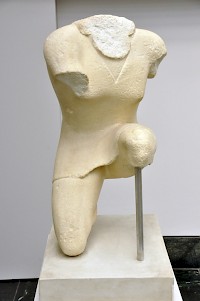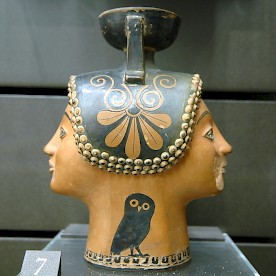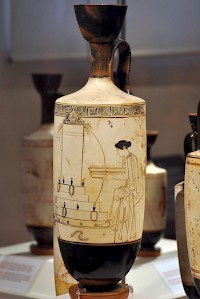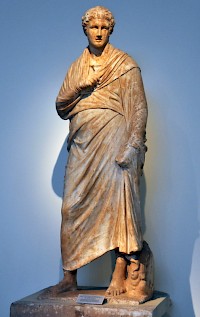Eretria - Livius (original) (raw)
Eretria (Greek Ἐρέτρια, "the rowers' town"): city and port on the Greek island of Euboea.
Early History
Eretria, Temple of Apollo, Statue of an Amazon
Situated on the southern part of the island of Euboea, Eretria was easily accessible from the Aegean Sea. For sailors, the site was easy to find because a tall mountain, Olympus, rises behind the city. One of the foothills, about 130 meters high, was Eretria's acropolis.
Originally, Eretria may have been the port of the ancient site that today is known as Lefkandi, a tenth/ninth-century BCE town that was a bit further to the west. After about 825 BCE, however, Lefkandi was abandoned and Eretria started to grow. Perhaps the Lefkandians moved to their port, although Strabo and Velleius Paterculus record a tradition that Eretria was colonized from Athens.note[Strabo, Geography 10.1.8; Velleius Paterculus, Roman History 1.4.1.]
Not much later, Homer mentions the Eretrians as joining the Greek expedition to Troy.note[Homer,Iliad 2.537.] Because the "Catalog of Ships" in which Eretria is mentioned is an older document than the Iliad, it may well be that the Eretrians mentioned by Homer are in fact the people of Lefkandi.
International Relations
Eretria and its western neighbor took part in the first phase of the Greek colonization movement: among its colonies were Pithecusae and Cumae in Italy.note[Dionysius of Halicarnassus, Roman Antiquities 7.3.1.] Later, the two cities became rivals. Towards the end of the eighth century, Eretria (supported by Miletus) and Chalcis (supported by Samos) were involved in the Lelantine War,note[Herodotus, Histories 5.99.] which led to the demise of Euboea, although Herodotus believed Eretria was quite prosperous.note[Herodotus, Histories 6.127.]
However that may be, from now on, Eretria founded its colonies alone (e.g., Therma, future Thessaloniki, and the cities of the Pallene and Athos peninsulas.note[Strabo, Geography 10.1.8.] It may have been a base of the Pisistratids, the family of Athenian tyrants in the sixth century.note[Herodotus, Histories 1.61.]
Two-headed phial from Eretria
When the Ionian Greeks in Asia Minor (led by Eretria's former ally Miletus) revolted against the Persian Empire, the Eretrians and Athenians supported them;note[Herodotus, Histories 5.99.] in 499, their soldiers took part in the sack of the Persian administrative center at Sardes.
The Persians considered this a casus belli and in 490 attacked the European Greeks. They destroyed Eretrianote[Herodotus, Histories 6.100-101.] and deported its inhabitants to Elam;note[Herodotus, Histories 6.119.] reportedly, the descendants of those Eretrians were still recognizable as late as the mid-first century CE.note[Philostratus, Life of Apollonius 1.23.] The Persians continued to Athens but were defeated at Marathon.
Athenian Subject
Many Eretrians had been absent from their city in 490, hiding in Oropus on the opposite shore,note[Herodotus, Histories 6.100.] and therefore, there were Eretrian soldiers to take part in the successful defense of Greece against the Persian king Xerxes, who invaded Greece in 480. Eretrians are mentioned during the naval battle of Artemisium and the battle of Plataea.note[Herodotus, Histories 8.1, 9.28.] Strabo implies that Eretria was rebuilt after the Persian War on a different place,note[Strabo, Geography 10.1.10.] but this is contradicted by archaeologists.
Later, we find Eretria as a tribute-paying member of the Delian League. They must have been important to the Athenians, because Euboea produced food for the big city.
Lekythos from Eretria.
Like many members of the Delian League, Eretria did not like to see how the anti-Persian league became an Athenian Empire. An attempt to leave the alliance was foiled in 446. During the Decelean War (413-404), the Euboean towns had more success and revolted from Athens (411), but in the years after the war, the Athenians recovered the island, which was a member of the Second Delian League. In 349, the Eretrians revolted again, became independent indeed, were subject by the Macedonians, and were again conquered by the Athenians.note[Cf. Plutarch, Phocion 12.1-13.4.] The whole episode had lasted eight years.
Hellenism
After 338, the Macedonian king Philip II imposed a common peace on the Greek towns, which were united in the Corinthian League. His son Alexander the Great (r.336-323) would use soldiers from Greece to subdue the Persian Empire. For Eretria, the common peace was the beginning of a period of great prosperity. After the annexation of Styra, the city's territory expanded to the southeast.
Even better, one of the successors of Alexander, Cassander, had his residence in Eretria, which received new city walls. The city retained its autonomy when the Antigonid dynasty came to power in Macedonia.note[Diodorus, World History 19.78.3.] This was the age of Menedemus, the rather obscure founder of a little-known philosophical school.note[Diogenes Laertius, Lives of the Eminent Philosophers 2.17.]
However, Eretria joined the other Greek cities during the Chremonidian War (267-262), in which the Greeks attempted to get rid of its northern overlord. After the Greek defeat, Eretria received a Macedonian garrison.
Roman Age
Eretria, Gymnasium, Statue of Cleonicus
This made Eretria a logical target when the Romans attacked the Macedonians (the Second Macedonian War, 200-197). The Roman navy, supported by the fleets from Rhodes and Pergamon, blocked the port and besieged the city, which was eventually captured and looted.note[Livy, History of Rome since the Foundation 32.16.] It is possible that the painting of the Battle of Issus, in which Alexander defeated the Persians, made by Philoxenus of Eretria for Cassander,note[Pliny the Elder, Natural History 35.110.] was among the objects that was seized. It was copied in Italy and is known to us as the Alexander Mosaic from Pompeii.
Because the Romans left the Greek towns "free and autonomous", Eretria received its independence againnote[Polybius, World History 18.45.4.] and appears to have enjoyed a new period of prosperity. However, the city was destroyed in 87, during the First Mithridatic War. After this, the city appears to have become Athenian in some way, because the emperor Augustus gave Eretria its independence again.note[Cassius Dio, Roman History 54.7.1.] By then, the city was in decline, although it was still considered the second town of Euboea.note[Strabo, Geography 10.1.10.]



